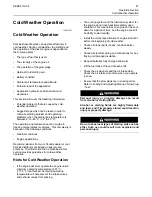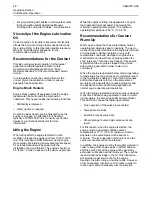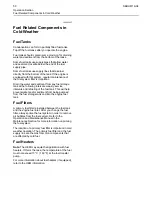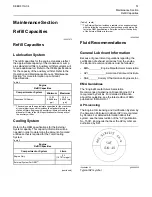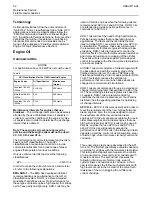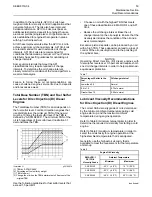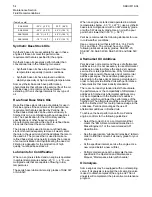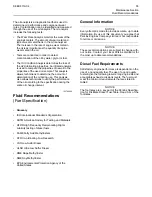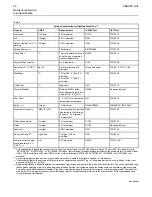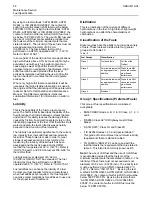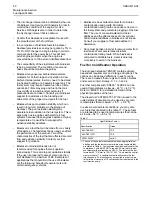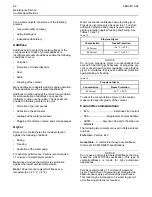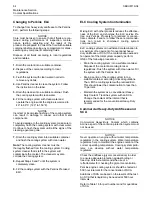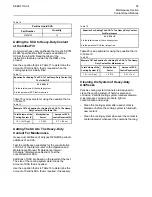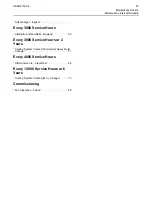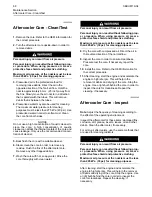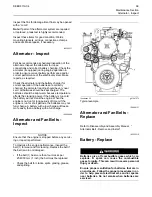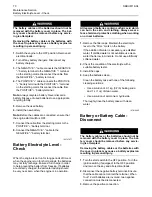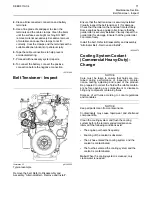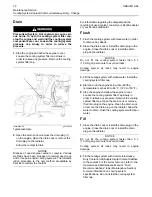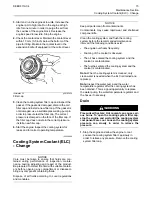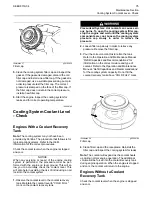
Mixing alcohol or gasoline with diesel fuel can
produce an explosive mixture in the engine
crankcase or the fuel tank. Alcohol or gasoline
must not be used in order to dilute diesel fuel.
Failure to follow this instruction may result in
death or personal injury.
There are many other diesel fuel specifications that
are published by governments and by technological
societies. Usually, those specifications do not review
all the requirements that are addressed in table 9 . To
ensure optimum engine performance, a complete
fuel analysis should be obtained before engine
operation. The fuel analysis should include all of the
properties that are stated in the table 9 .
Fuel Additive
Supplemental diesel fuel additives are not generally
recommended. This is due to potential damage to the
fuel system or the engine. Your fuel supplier or the
fuel manufacturer will add the appropriate
supplemental diesel fuel additives.
Perkins recognizes the fact that additives may be
required in some special circumstances. Fuel
additives need to be used with caution. Contact your
fuel supplier for those circumstances when fuel
additives are required. Your fuel supplier can
recommend the appropriate fuel additive and the
correct level of treatment.
Note:
For the best results, your fuel supplier should
treat the fuel when additives are required. The
treated fuel must meet the requirements that are
stated in table 9 .
i02962446
Fluid
Recommendations
(Coolant
Specifications)
General
Coolant
Information
NOTICE
Never add coolant to an overheated engine. Engine
damage could result. Allow the engine to cool first.
NOTICE
If the engine is to be stored in, or shipped to an area
with below freezing temperatures, the cooling system
must be either protected to the lowest outside tem-
perature or drained completely to prevent damage.
NOTICE
Frequently check the specific gravity of the coolant
for proper freeze protection or for anti-boil protection.
Clean the cooling system for the following reasons:
• Contamination of the cooling system
• Overheating of the engine
• Foaming of the coolant
NOTICE
Never operate an engine without water temperature
regulators in the cooling system. Water temperature
regulators help to maintain the engine coolant at the
proper operating temperature. Cooling system prob-
lems
can
develop
without
water
temperature
regulators.
Many engine failures are related to the cooling
system. The following problems are related to cooling
system failures: Overheating, leakage of the water
pump and plugged radiators or heat exchangers.
These failures can be avoided with correct cooling
system maintenance. Cooling system maintenance is
as important as maintenance of the fuel system and
the lubrication system. Quality of the coolant is as
important as the quality of the fuel and the lubricating
oil.
Coolant is normally composed of three elements:
Water, additives and glycol.
Water
Water is used in the cooling system in order to
transfer heat.
Distilled water or deionized water is
recommended for use in engine cooling systems.
DO NOT use the following types of water in cooling
systems: Hard water, softened water that has been
conditioned with salt and sea water.
If distilled water or deionized water is not available,
use water with the properties that are listed in Table
12 .
Table 12
Acceptable Water
Property
Maximum Limit
Chloride (Cl)
40 mg/L
Sulfate (SO
4
)
100 mg/L
Total Hardness
170 mg/L
Total Solids
340 mg/L
Acidity
pH of 5.5 to 9.0
SEBU8119-04
61

